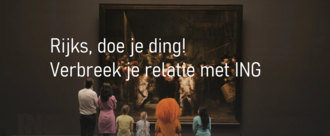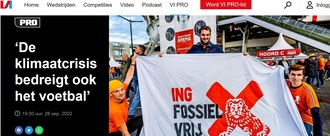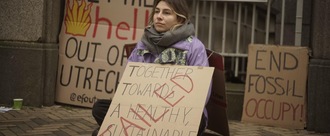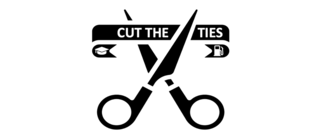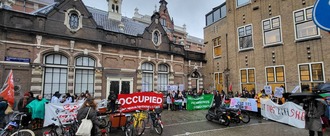-
Zap fossiele reclames weg rond onze favoriete podcasts en programma’s!• Fossiele reclame stimuleert extra uitstoot en vertraagt gedragsverandering. • Ze houdt vervuilende industrieën in een positief daglicht, ondanks de bewezen schade. • Wetenschappelijk onderzoek laat zien dat dergelijke reclames het effect van klimaatinformatie ondermijnen. Kunnen programma’s en podcasts zonder fossiele reclame? Ja. Net als bij het verbod op tabaksreclame zullen fossiele advertenties worden vervangen door alternatieve advertenties. Daarom: Zap fossiele reclame weg uit ons wereldbeeld!26 van 100 HandtekeningenGemaakt door Reclame Fossielvrij

-
Stop gaswinning in de Noordzee!Na een jarenlange strijd van omwonenden en actiegroepen heeft het kabinet besloten géén gas meer te winnen in de Waddenzee bij Ternaard. Nu is het aan het nieuwe kabinet de volgende stap te zetten en ook de gaswinning in de Noordzee te stoppen. Het is glashelder: om de klimaatcrisis niet verder te laten ontsporen, is er geen enkele ruimte voor nieuwe fossiele boringen. Dat zeggen wetenschappers en het Internationaal Energie Agentschap (IEA). Als Nederland dit signaal negeert, hoe kunnen we dan van andere landen verwachten dat ze het wél serieus nemen? De gasindustrie grijpt het debat rondom Noordzeegas aan om te lobbyen voor een nieuwe fossiele subsidie: een grotere investeringsaftrek. Nieuwe fossiele subsidies zijn absurd, we moeten juist van fossiel af. We kunnen niet toestaan dat onze politici koehandel spelen met de toekomst van de planeet. De hoeveelheid Noordzeegas is op wereldschaal verwaarloosbaar. Omdat gas op de wereldmarkt wordt verhandeld, wordt onze energierekening niet lager van een beetje gas uit de Noordzee. We hebben niets aan valse oplossingen – we moeten inzetten op energiebesparing en hernieuwbare energie van eigen bodem.2.703 van 3.000 HandtekeningenGemaakt door Fossielvrij NL
-
GroenLinks-PvdA, zorg voor een gasvrij Nederland!Nederland is gasverslaafd, en na jaren met de VVD aan de macht is er niets gedaan om dit te stoppen. In plaats van in te zetten op gasvrij worden na de Russische inval in Oekraïne, zijn we massaal vloeibaar gas uit de VS gaan importeren. Onze leiders laten zich gijzelen in fossiele bondjes met autoritaire leiders. Zo heeft de EU net een gasdeal gesloten met Trump voor 750 miljard dollar. Dat betekent meer mislukte oogsten, overstromingen en ziekmakende vervuiling. Bovendien betalen wij mee aan Poetins oorlogskas en de uitholling van de democratie door Trump. We moeten zo snel mogelijk stoppen met de import van vloeibaar gas, gas afbouwen en de controle terugpakken over onze energievoorzieningen. Door hernieuwbare energie van eigen bodem snel op te schalen wordt Nederland schoner, goedkoper en breken we vrij van autoritaire regimes. Een eerlijke, groene wereld kán. De verkiezingen zijn een kans om onze koers te veranderen. Dat begint bij een sterk verhaal voor een gasvrij Nederland in ons verkiezingsprogramma.2.708 van 3.000 HandtekeningenGemaakt door Fossielvrij NL
-
Steun gemeente Den Haag, bescherm het verbod op fossiele reclame!Fossiele reclames blijven toestaan is als dweilen met de kraan open. Het promoot namelijk extra uitstoot van broeikasgassen en schadelijke luchtvervuiling, en tast daarmee onze gezondheid en een leefbaar klimaat aan. Ook ondermijnt fossiele reclame draagvlak voor broodnodig klimaatbeleid. Het verbod op tabaksreclame leert en talloze wetenschappelijke publicaties leren ons dat een verbod op fossiele reclame essentieel is voor een eerlijke en haalbare klimaattransitie. Op dit moment kopen de grootste en meest vervuilende bedrijven reclameruimte op in de publieke ruimte. Grote vervuilers bepalen met reclame wat mensen te zien krijgen, wat onze keuzevrijheid beperkt. Hiermee normaliseren ze vervuilende producten en diensten bovendien en sporen ze overconsumptie aan, terwijl we juist ruimte nodig hebben voor duurzame normen en waarden. De gezondheid van ons allemaal is veel belangrijker dan de mogelijkheid van grote vervuilende bedrijven om reclame te maken. De gemeente Den Haag staat dus in haar volste recht om fossiele reclame te weren, en zo de gezondheid en een gezonde leefomgeving voor haar inwoners te beschermen. Dit doen via de APV, een lokale wet, is juridisch mogelijk en zelfs de meest wenselijke route, stellen juristen. Den Haag is wereldwijd de eerste stad die een verbod op fossiele reclame per wet regelt. Dat maakt het makkelijker voor al die andere gemeenten in Nederland en de wereld die fossiele reclame willen verbieden. Het nieuws dat Den Haag fossiele reclames verbiedt, ging niet voor niets de hele wereld over. Het is belangrijker dan ooit dat gemeenten opkomen voor onze gezondheid en het klimaat. Verder lezen? • Vind hier alle feiten over (een verbod op) fossiele reclame op een rij • Vind hier onze FAQ over deze rechtszaak5.343 van 6.000 HandtekeningenGemaakt door Reclame Fossielvrij

-
Bevrijd filmhuizen van fossiele reclamesBeste filmhuizen, Wij, acteurs, regisseurs, scenarioschrijvers, producenten en filmliefhebbers, wij houden van films. Als filmhuis bieden jullie een plek om mooie films te vertonen, die belangrijke verhalen vertellen, confronteren, inspireren en aan het denken zetten. Maar er is iets dat ons dwarszit: terwijl wij genieten van jullie films zien we fossiele reclames voorbij komen. Fossiele reclames zijn reclames voor bijvoorbeeld luxe auto’s, vliegreizen en de fossiele industrie. Deze reclames verleiden om meer vervuilende producten te consumeren. Dat zorgt voor meer uitstoot door kolen, olie en gas. Daarnaast misleiden deze reclames; ze proberen vervuilende bedrijven groener en positiever af te schilderen. Greenwashing dus! Om de klimaatcrisis in te perken is het belangrijk om zo snel mogelijk de uitstoot van fossiele brandstoffen te verminderen. De logische eerste stap is de afschaffing van reclames die fossiele brandstoffen en fossiele bedrijven promoten. Bioscoopreclame-exploitanten zijn verantwoordelijk voor de reclames in filmhuizen. Wij roepen jullie daarom op om je uit te spreken tegen fossiele reclames en de exploitanten te laten weten dat fossiele reclames niet thuishoren in het filmhuis. Laten we samen zorgen dat het filmhuis stopt met het verspreiden van een boodschap die méér schade doet aan het klimaat. Daarom: laat het doek vallen voor fossiele reclame! Hartelijke groet, Acteurs: Carice van Houten, Ramsey Nasr, Katja Herbers, Anniek Pheifer, Waldemar Torenstra, Sieger Sloot, Rifka Lodeizen, Frieda Barnhard, Marnie Blok, Hanna van Vliet, Sigrid ten Napel, Tirsa With, Nadja Hüpscher, Hannah Boer Regisseurs en scenarioschrijvers: Maria Goos, Bram Schouw, Maarten Treurniet, Jacco Groen, Dewi Reijs, Systke Kok, Jonas Klinkenbijl, Remy van Heugten Producenten en productiedesigners: Laurette Schillings, Koji Nelissen, Derk Jan Warrink, Jorien Sont, Minka Moren, Femke Hoebe, Ellen Havenith, Marty Keizer, Iris Otten, Lisette Kelder, Symen Versloot Filmhuizen: Kriterion, WORM, De Uitkijk, Cinecenter, LAB111, Rialto & Reclame Fossielvrij Werk jij in de filmindustrie? Vul dan ook het steunformulier in op onze website: https://verbiedfossielereclame.nl/filmhuizen-zonder-fossiele-reclame/ (deze lijst wordt regelmatig geupdatet)3.126 van 4.000 HandtekeningenGemaakt door Reclame Fossielvrij

-
Rijksmuseum, doe je ding: verbreek je sponsorrelatie met INGING zegt het klimaatakkoord van Parijs te onderschrijven maar heeft sinds dat akkoord meer dan 60 miljard euro uitgeleend aan fossiele bedrijven. ING heeft ook gezegd te stoppen met de financiering van olie- en gaswinning... in 2040. Over 16 jaar. En dat gaat alleen om het oppompen van olie en gas – ze gaan dan zelfs nog door met het financieren van gasfabrieken en pijpleidingen. Dit is onverteerbaar: de crisis is NU! Het is goed om te weten dat de sponsorbijdrage van ING naar schatting nog geen 1% van de totale begroting van het Rijksmuseum bedraagt. Voor ING is de sponsoring belangrijker dan voor het Rijks: hiermee kan ING hun vieze imago oppoetsen. Het Van Goghmuseum, NEMO en het Concertgebouworkest braken eerder al de sponsorrelatie met Shell. Recent verbrak Eye Filmmuseum de sponsorrelatie met KLM vanwege het klimaat. Tijd voor het Rijksmuseum om deze voorbeelden te volgen. Zie voor meer info over de vervuilende financieringen van ING: www.ingfossielvrij.nl5.670 van 6.000 HandtekeningenGemaakt door Marilyn Ruiter
-
Uitgevers: verlos kranten van fossiele reclameFossiele reclames in de krant doen grote maatschappelijke schade. Kranten hebben een grote verantwoordelijkheid in de klimaatcrisis. Hun informerende artikelen bereiken vele lezers en dragen bij aan kennis en gevoelde urgentie. Maar ook hun fossiele reclames hebben een groot bereik. Die reclames misleiden over de oorzaak, de schade en de urgentie. Of ze verleiden lezers om méér olie en gas te verbruiken. - Fossiele reclames zorgen voor een groei van broeikasgassen - Fossiele reclames zorgen dat fossiel vervoer en de fossiele industrie normaal blijven. Massale gedragsverandering blijft mede daardoor uit. - Fossiele reclames beïnvloeden de manier waarop de politiek de klimaatcrisis aanpakt. - Bovendien blijkt uit wetenschappelijk onderzoek dat fossiele reclames het positieve effect van klimaatartikelen ondermijnen. Kunnen kranten stoppen met fossiele reclames? Ja, dat kan. Een onlosmakelijk onderdeel van de klimaattransitie is ook om het verdienmodel fossielvrij te maken. Uitgevers van kranten zoals Mediahuis en DPG Media zijn multinationals en maken honderden miljoenen winst per jaar. Ze kunnen een risico dragen. Bovendien, kranten hebben ook het verbod op tabaksreclame overleefd. Kranten in het Verenigd Koninkrijk en Zweden die stopten met fossiele reclame kregen meer donaties en abonnees.5.406 van 6.000 HandtekeningenGemaakt door Reclame Fossielvrij

-
KNVB: laat de leeuw niet in de olie staan!Ook het voetbal wordt geraakt door de klimaatcrisis. Extreme hitte, overstromingen en grote klimaatrampen raken spelers en fans en maken het veld onbespeelbaar. De verbranding van fossiele brandstoffen vervuilt de lucht waarin we voetballen. Ook het voetbal heeft er dus groot belang bij dat de klimaatcrisis niet nog verder escaleert. De KNVB moet daarin zijn verantwoordelijkheid nemen, als organisatie met 1,2 miljoen leden. Zoals bekend wordt de KNVB gesponsord door de ING Bank. ING stak in 2021 11 miljard euro in de fossiele industrie; en in 2022 5 miljard euro. Daarmee blijft de fossiele industrie nieuwe fossiele projecten opstarten. Alle experts zijn het erover eens: we moeten zo snel mogelijk van de fossiele energie af en nieuwe fossiele projecten starten kan dus echt niet meer. Zie voor meer info www.ingfossielvrij.nl. ING sponsort graag het Nederlandse voetbal. Door zich met voetballende kinderen en topsporters te associëren, krijgen we een goed gevoel bij de bank. En vergeten we hoe ING fossiele bedrijven helpt bij het verwoesten van de aarde waarop die kinderen voetballen. Fossil Free Football heeft de KNVB hier vorig jaar al op gewezen. En we stonden met een spandoek bij de Johan Cruijff Arena voor Nederland - België. Tot nu toe weigert de KNVB echter om ING aan te spreken op de financiering van fossiele bedrijven en projecten. We gaan het de KNVB dus nog een keer vragen en dit keer met zoveel mogelijk voetbalfans en KNVB-leden. Beste KNVB, laat de leeuw niet in de olie staan!1.806 van 2.000 HandtekeningenGemaakt door Frank Huisingh
-
SUPPORT OUR DEMANDS TO UTRECHT UNIVERSITYThe climate catastrophe is now, it is a real threat to human and planetary well-being, and we are extremely close on time to avoid worse consequences. This was the conclusion of the latest IPCC report, in which the world’s leading scientists call for a radical and fast transformation of our economy, politics, and society: “We are at a crossroads. The decisions we make now can secure a livable future”. We need research that truly works towards the University’s vision of “a better world”, and that removes barriers to achieving this. Universities must create room for nurturing radical new ideas and provide their students and staff with the tools necessary to be a part of transforming our society.247 van 300 HandtekeningenGemaakt door EFO Utrecht
-
Manifesto: Call for WUR to cut ties with the fossil fuel industryThe petition will be used to show to the board that there is an overwhelming amount of concerned staff and students who care about our commitments as a university!668 van 800 HandtekeningenGemaakt door Concerned student and staff
-
We ask our executive boards to cut the ties with the fossil fuel industryUniversities are closely tied to the fossil industry through student "eco-awards", campus recruitment activities, alumni networks, research funding and sponsorships of student associations. Those ties are increasingly under pressure. Under the banner of End Fossil: Occupy! students occupied Erasmus University Rotterdam, Eindhoven University of Technology and the University of Amsterdam. Dutch researchers and internationally respected climate scientists emphatically backed the students' demand: cut the ties with the fossil industry. A new consensus seems to be emerging in the responses from executive boards. The enthusiasm of students and staff is spoken of with understanding. But there is nothing wrong as long as we work on 'green' projects with the industry. Here, soothing words like 'dialogue,' 'connection' and 'innovation' are used. Go back to work or study in peace. With this response, the boards are getting off too easy. It seems primarily motivated by maintaining research funding and a sustainability image. There is no room for the fundamental question of what we stand for as an academic community. That's problematic. First of all, that community stands for truth-telling. We strive to tell the truth without hiding existing uncertainties. For the fossil industry, truth has proven to be a much more malleable concept. As the scientific evidence on climate change accumulated, it began vilifying climate scientists and funding doubt campaigns that continue to affect the social polarization surrounding climate change in the United States to this day. In the Netherlands, Shell made a contribution by funding climate skeptic Frits Böttcher. Second, the academic community stands for countering bias. However, research centers sponsored by the fossil industry write significantly more positively about gas than centers where such sponsorship is absent or much less present. And for decades, industry-sponsored economists focused only on the perceived costs of effective climate policy without including the benefits. Companies still so deep in oil and gas will try to secure their fossil interest - especially through research projects that provide a green image. Finally, the academic community stands for a just and livable future. For a fair transition with no more than one and a half degrees of warming, rich countries like the Netherlands must phase out fossil fuels completely by 2034. You don't need to come up with this with fossil fuel companies. Released communications show that Shell employees are internally told that a path towards net zero emissions "has nothing to do with our business plans". External research also confirms that Shell is still busy with new fossil infrastructure - such as under the Wadden Sea - which cannot be built at all if we want to meet the climate goals. Addressing the climate crisis requires a strong academic community that defends truth-telling, does not accept bias and takes seriously its concern for future generations. On that basis, it should cut all ties with corporations that knowingly work toward an unlivable future. Fossil companies are willing to undermine climate science when it suits them better and they are they not on the path to a fossil-free world at a pace that does justice to the current crisis situation. The academic community we envision sets its own balanced research agenda for the transition. It is represented by the moral leadership of executive boards who dare to make difficult choices and take a stand against the rhetoric that we must "transition with fossil fuel companies". That such leadership is possible is proven by the severing of ties with the South African apartheid regime in the 1970s and very recently with the tobacco industry and Russian and Belarusian educational institutions. Students and staff would prefer to be committed to the great social and technological challenges in the outside world. But as long as ties to fossil industries remain, the campus will also be the domain of their engagement.354 van 400 HandtekeningenGemaakt door Guus Dix
-
855 van 1.000 HandtekeningenGemaakt door University Rebellion UvA


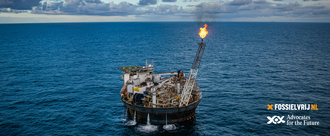
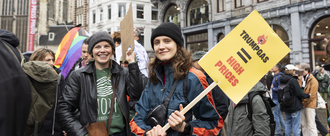
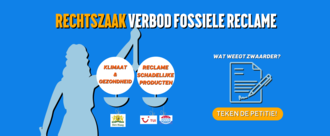%20(1).png)

